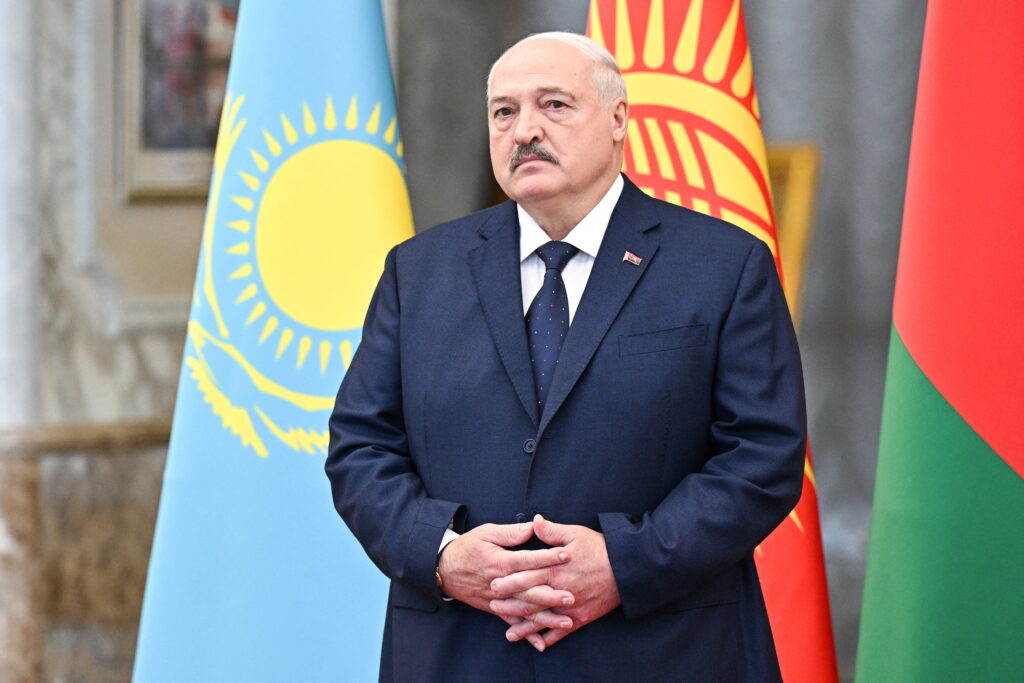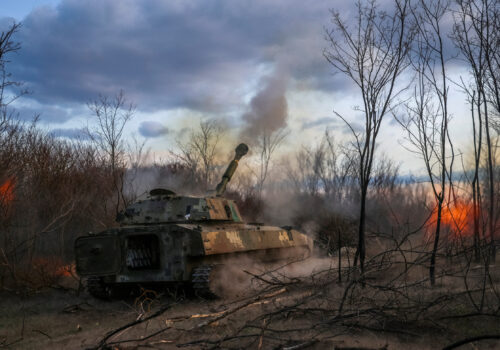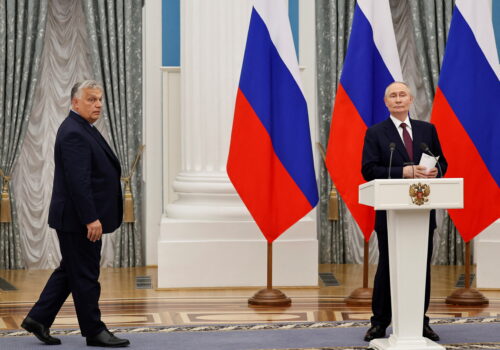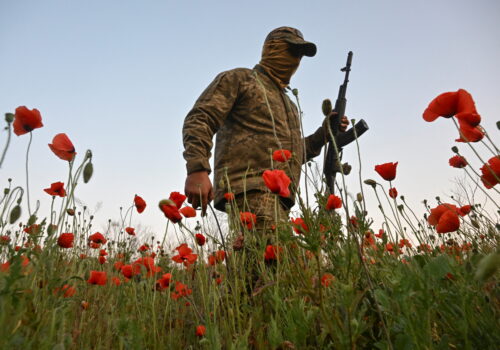More than five years since pro-democracy protests threatened to topple the regime of Belarusian dictator Alyaksandr Lukashenka, relations between Belarus and the country’s European neighbors remain locked in a downward spiral that is only adding to the instability of the wider region.
When Lukashenka resorted to a brutal crackdown against protesters in 2020, the West responded with sanctions and withdrawal. The aim was to impose penalties on the Belarusian ruler and ensure his political and diplomatic isolation. Five years on, it is now abundantly clear that this has failed to prevent Belarus from sliding further into dictatorship.
Today, large numbers of Belarusian political prisoners remain behind bars amid a political climate that is more repressive than ever. Meanwhile, the Kremlin has capitalized on Lukashenka’s predicament to strengthen its grip on Belarus and involve the country in Russia’s geopolitical ambitions. Belarus is now not only a nation with a weakened civil society and undermined sovereignty that is moving further away from democracy; it has also become a threat to international security.
If Europe maintains its present policies, it is safe to assume that relations with Belarus will remain on the current trajectory. This may suit Lukashenka, who has managed to stabilize his rule and minimize the threat posed by his exiled opponents. It would certainly suit Russia, which has used the last five years to strengthen control over Belarus and weaponize the country against its European neighbors.
However, regional security would be further undermined, with broader Euro-Atlantic strategic interests also likely to suffer. This would be particularly unwelcome at a time when the democratic world already faces growing challenges from an emerging alliance of autocratic powers including Russia, China, Iran, and North Korea.
Stay updated
As the world watches the Russian invasion of Ukraine unfold, UkraineAlert delivers the best Atlantic Council expert insight and analysis on Ukraine twice a week directly to your inbox.
The Belarusian role in European security should not be underestimated. Following the watershed events of 2020, Lukashenka abandoned his earlier geopolitical balancing act and became a loyal supporter of Russia’s war in Ukraine. Belarus served as a crucial launchpad for the February 2022 full-scale invasion, and has since agreed to host Russian nuclear weapons. Moscow also uses the country as a proxy in its hybrid war against the European Union, including the weaponization of migrants along the Belarusian border with the EU.
It is important to stress that the current standoff between Belarus and Europe is complex and multifaceted, with a number of overlapping but distinct elements. These include European criticism of widespread human rights violations in Belarus and alarm over the country’s deepening military cooperation with the Kremlin. There are also broader concerns related to international migration and regional stability.
If European leaders want to make any meaningful progress on these issues, they will need to move away from the current explicitly confrontational stance and adopt an alternative approach that creates room to engage on matters of mutual interest. Sanctions will remain a necessary tool against those supporting the war in Ukraine, but this approach in general has already proven to have limited impact on Minsk. A more outcome-oriented strategy that envisages a revived diplomatic presence and pragmatic engagement would enable Europe to address its concerns while maintaining constructive pressure on the Lukashenka regime.
Eurasia Center events

The United States has recently demonstrated that it is possible to achieve progress with Belarus by focusing on a humanitarian agenda. US Special Envoy Keith Kellogg visited Minsk in June 2025 after months of preparations, resulting in the release of fourteen political prisoners. US President Donald Trump has directly discussed prisoner releases with Lukashenka, signaling a readiness to prioritize engagement over isolation in his approach to Belarus. A further US visit to Minsk in September led to the release of 52 prisoners in return for lifting sanctions on national aviation company Belavia.
An updated EU strategy toward Belarus should pursue reduced confrontation by focusing on a number of deliverables. The top priority must be saving lives by securing the release of more than 1000 political prisoners. This will require active diplomacy, measured communication, and a readiness to compromise. It will also be necessary to engage on practical matters such as finding a resolution to the migrant crisis on the Belarusian border with the EU, restoring severed air and rail transportation ties which have restricted mobility for Belarusians across Europe, and ending repressions in Belarus.
In parallel to any increased diplomatic engagement, the European Union and individual European nations could also consider expanding their involvement in social programs for Belarusians. A more people-oriented approach could help rebuild relationships by providing support for vulnerable Belarusians who have suffered as a result of cuts to foreign aid in recent years.
Security issues will inevitably be at the heart of any reset between Europe and Belarus. Lukashenka openly underscores his role as Vladimir Putin’s closest wartime ally and junior partner in Moscow’s confrontation with the West. While Europe currently has little chance of breaking up this unequal partnership, confidence-building measures could help to reduce mutual suspicions and pave the way for a more constructive dialogue addressing key security concerns.
Belarus is a strategically important European nation that no European leader can afford to ignore. The country’s descent into international isolationism and authoritarianism is a European problem that poses difficult questions for the EU in terms of border security and foreign policy credibility. Evidently, the positions adopted in 2020 have not produced the desired results. It is therefore time to consider new approaches and initiatives.
A smarter Belarus policy does not mean abandoning a critical and clear-eyed view of the country’s situation. Engagement does not equal appeasement. Instead, the goal should be an outcome-driven strategy that seeks practical and pragmatic solutions to specific problems while providing incentives for more fundamental shifts in Minsk. Ignoring Belarus or treating it as a lost cause will only amplify current geopolitical challenges while deepening the existing human rights problems in the country.
Valery Kavaleuski is head of the Euro-Atlantic Affairs Agency. He previously served as a Belarusian diplomat and as foreign relations lead to Belarusian opposition leader Sviatlana Tsikhanouskaya.
Further reading
The views expressed in UkraineAlert are solely those of the authors and do not necessarily reflect the views of the Atlantic Council, its staff, or its supporters.

The Eurasia Center’s mission is to enhance transatlantic cooperation in promoting stability, democratic values, and prosperity in Eurasia, from Eastern Europe and Turkey in the West to the Caucasus, Russia, and Central Asia in the East.
Follow us on social media
and support our work
Image: Belarusian dictator Alyaksandr Lukashenka waits for participants to arrive before a meeting of the Supreme Eurasian Economic Council in Minsk, Belarus. June 27, 2025. (Sputnik/Sergey Bobylev/Pool via REUTERS)





